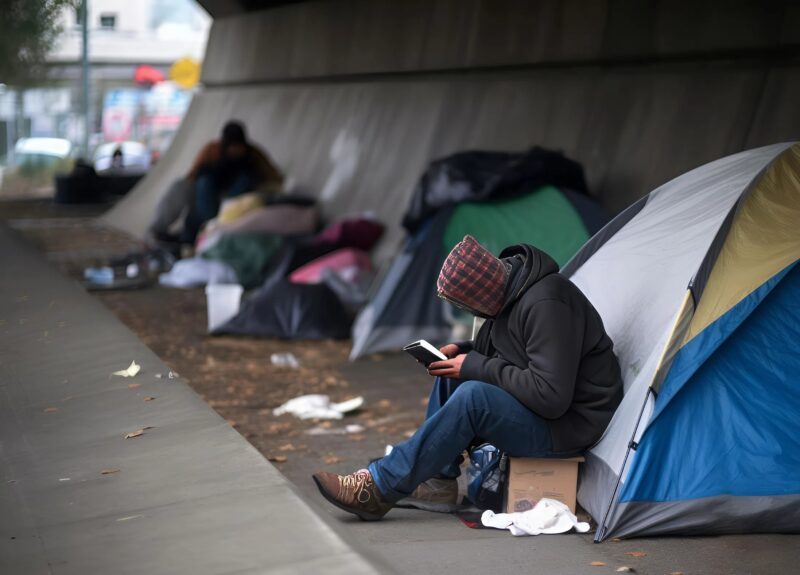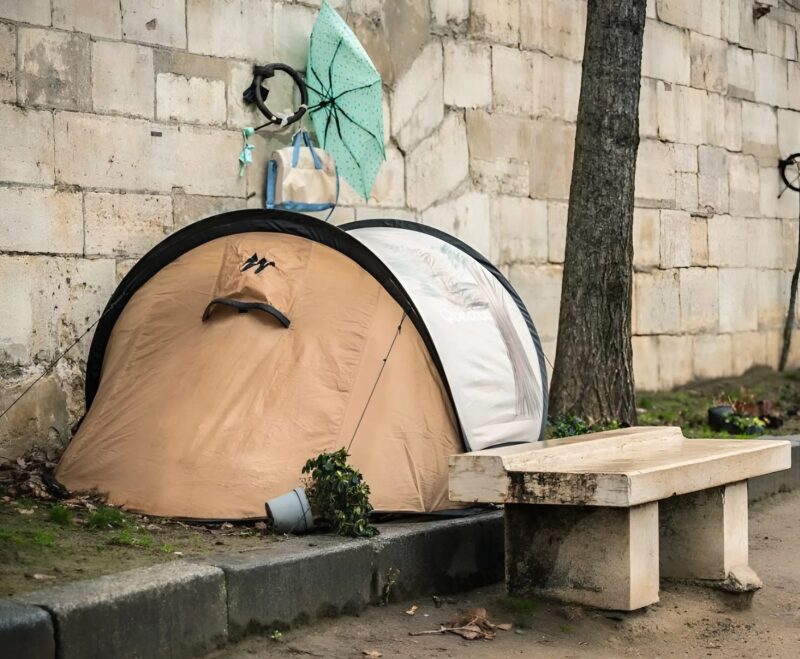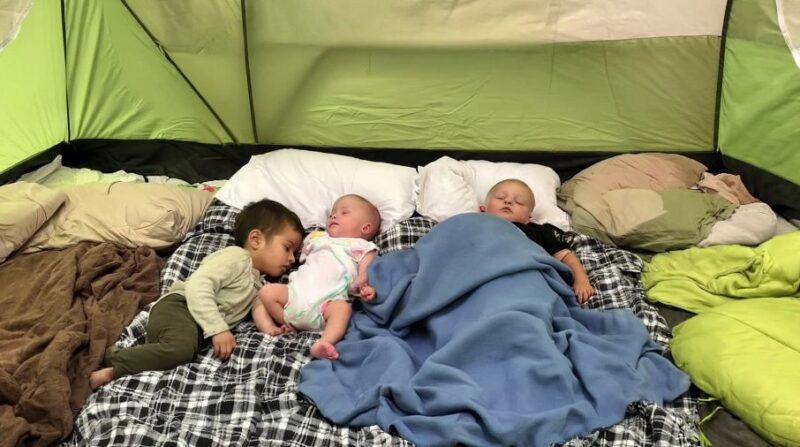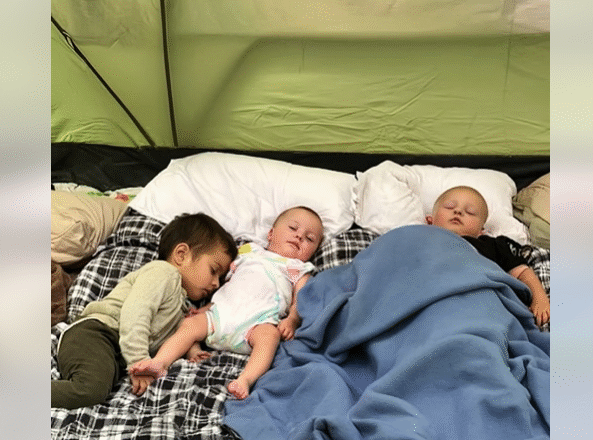My sons think we’re camping… but they don’t know we’re homeless.
They’re still asleep, the three of them curled under a thin blue blanket, like it’s their little cocoon. I watch them breathe softly, and for a moment, I pretend we’re on vacation.
We set up our tent behind a rest area, just past the county line. It’s not really allowed, but it’s quiet. The security guard looked at me yesterday, a look that said he wouldn’t make us leave… not yet.
I told the boys we were going camping. “Just the guys,” I said, like it was an adventure. I didn’t tell them I had sold my wedding ring three days earlier to pay for gas and a jar of peanut butter.
They’re still too young to understand. To them, sleeping on air mattresses and eating cereal from paper cups is fun. They think I’m brave, that I have a plan.
But the truth is, I’m looking everywhere for a shelter that can take four people. None have space before maybe Tuesday. Maybe.
Their mom left six weeks ago, saying she was going to her sister’s. She left a note and half a bottle of Advil on the counter. I haven’t heard from her since.
I’m holding on the best I can. I wash up in gas station bathrooms, make up stories to help them sleep, keep the routines going like everything’s fine.

But last night, Micah, my middle son, mumbled in his sleep: “Daddy, I like this better than the motel.”
It broke me. Because he meant it. And because I know this might be the last night I can pretend it’s just a game.
When they wake up, I’ll have to tell them something I’ve been avoiding.
Just as I opened the tent, Micah called softly: “Daddy, can we go see the ducks again?”
I promised we would once his brothers were ready.
After packing up and brushing our teeth in the sink behind the building, the sun was already warming the grass. Toby, the youngest, held my hand while humming, and Caleb, the oldest, threw rocks and asked if we’d go hiking.
I was about to tell them we couldn’t stay when I saw a woman approach. She was around seventy, wearing an old plaid shirt, holding a paper bag and a big thermos.
I was afraid she might tell us to leave—or worse, look at us with pity.
But she smiled and held out the bag. “Good morning, boys—anyone want some breakfast?”
The kids lit up before I could say a word. Inside the bag: warm biscuits and hard-boiled eggs. In the thermos: hot chocolate. Not coffee—chocolate, for them.
“My name’s Jean,” she said, sitting down on the curb with us. “I’ve seen you here a few nights.”
I didn’t know what to say. I didn’t want pity, but she didn’t offer any. Just kindness.
“I’ve had hard times too,” she added, like she could read my thoughts. “Not camping, no. I slept in a church van with my daughter for two months, back in ’99.”
I blinked. “Really?”
“Yes. People ignored us. I swore I’d never do the same.”
I don’t know why, but I told her the truth. About the motel, their mother, the shelters that say “maybe.”
She just listened, nodding slowly.
Then she said something unexpected: “Come with me. I know a place.”

I hesitated. “A shelter?”
“No, better.”
We followed her old car down a gravel road. My heart was pounding. The boys laughed at one of Toby’s jokes, unaware we were headed toward a miracle.
We arrived at a farm: a big red barn, a small white house, goats in the yard. A sign read: The Second Wind Project.
Jean explained from the porch: a community run by volunteers, offering temporary housing to families in crisis. No red tape. No forms. Just people helping people.
“You’ll have a roof, food, and time to get back on your feet,” she promised.
I swallowed hard. “What’s the catch?”
“None,” she said. “Just help out a little. Feed the animals, clean, maybe build something if you can.”
That night, we slept in real beds. All four of us in a room with walls, light, and a fan that hummed gently.
I tucked the boys in and sat on the floor, crying like a child.
The next week, I chopped wood, fixed a fence, learned to milk a goat. The kids made friends with another family—a single mom and her twin girls. They chased chickens, picked wild berries, and learned to say “thank you” at every meal.
One evening, sitting on the porch with Jean, I asked, “How did you find this place?”
She smiled. “I didn’t find it. I built it. I was a nurse. My grandma left me this land. I wanted to be a light—not just a memory.”
Her words stayed with me.

Two weeks became a month. I got a small job at a garage. A man named Frank offered me regular hours and a paycheck.
We stayed six more weeks. Then I was able to rent a small duplex. The floor tilted, the pipes rattled at night—but it was home.
The boys never asked why we left the motel or why we slept in a tent. They called it “the adventure.” Micah still tells people we lived on a farm and built a fence under the watchful eyes of goats.
Three months after we moved in, I found an envelope under the doormat. No name, just a handwritten “Thank you.”
Inside, an old photo of Jean—young, holding a baby in front of the barn—with a note:
“What you gave my mother, she gives back to you. Pay it forward when you can.”
Jean didn’t respond. The farm was empty. A new sign hung:
Rest now. Help someone else.
So I did. I shopped for an elderly neighbor, fixed a leaky sink, gave our tent to a homeless man.
One evening, a man knocked on our door—scared, with two kids. Someone at the food bank had said I might know a place.
I didn’t hesitate.
I made hot chocolate.
I let them sleep in our living room.
That was the beginning of a new chapter.
I spoke to Frank, who agreed to give him a job like he gave me. I found furniture, clothes, shoes for them.
Little by little, our house became a second chance for others.
I thought rock bottom was the end.
Now I know—for some—it’s a beginning.
We never went camping.
But by losing everything, we found more than I ever imagined.
And every night, when I tuck my boys in, I still hear Micah whisper:
“Daddy, I like this better.”
Me too, son. Me too.
Sometimes, you find room to grow in the lowest places.
